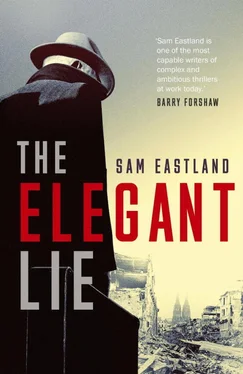Why should I believe you, Carter thought to himself, when even your own people don’t?
The headquarters of the US Military Police for the district of Liège was located in a manor house belonging to a horse breeder by the name of DeVont, who had made the unfortunate choice to supply a German cavalry regiment with mounts after the invasion of 1914. When that war ended, he spent the next twenty years trying to rebuild his reputation and his business, but when the Germans invaded again in the summer of 1940, he jumped at the offer of another lucrative contract: to board and train horses for the private stable of General Matthias Grob, German military governor of eastern Belgium. DeVont’s wife, who had stood by him through the nearly vertical ups and downs of his business dealings, finally snapped in September 1944, when the last Wehrmacht truck drove out of town, heading back towards Germany. That night, she took a bottle of 1896 Lafite Rothschild from their secret and well-supplied wine cellar and broke it over his head, killing him outright. Since DeVont was already on a list of collaborators to be rounded up by the Allies, American Military Police were the first to arrive on the scene. They handed Mrs DeVont over to the Belgian police, then took over the manor, quickly discovered the secret cellar and, over the next few months, quietly drank up the half-million dollars’ worth of wine that it contained.
When Carter and Riveira pulled up in front of the DeVont manor, they found the place in chaos. Cardboard boxes of files were being carried out of the building and pitched into a fire, which had been kindled in the waterless basin of a fountain just outside the main entrance. A concrete statue of a naked woman holding a large sea shell against one ear stood in the middle of the basin, flames roaring all around her.
Carter and Riveira were immediately relieved of their jeep. Then each man was handed a rifle and told to prepare for an imminent assault by German forces approaching along the same road Carter and Riveira had just taken to get there. When Carter tried to explain that they had not encountered any German troops on that road, and also that Riveira had a broken leg, they were ignored.
The two men spent the next twelve hours behind a hastily prepared barricade, waiting for an attack that never came. Although by morning they were allowed to stand down and Riveira was finally admitted to the field hospital, Carter spent another week helping to man the barricade in shifts. The rest of the time he was on standby, sleeping in the corrugated iron Quonset hut that the Military Police had built on what had once been the DeVonts’ tennis court.
Finally, on New Year’s Day 1945, news filtered back from the front that the great German offensive, which became known as the Battle of the Bulge, had ground to a halt.
Only then was Carter able to begin writing his report on the fuel theft. He spent the next several days hunched over a collapsible table in the hut, typing up his account. Given the short time he had been given to carry out his investigation and the limited access to information and interview subjects, his report was largely incomplete. If he had been following the rules of his police training, he would have diverted the whole matter to internal affairs, who investigated crimes within their own branch of service. But he had not been given instructions to do this by the Military Police. In fact, his orders clearly specified that his account would go directly to them.
On 6th January 1945, Carter finally finished the report. He left his perch beside a rusty potbellied stove, which was the only source of heat in the Quonset hut, and set out across a muddy parking lot towards the command post headquarters.
Carter presented his report to the commanding officer of the detachment and returned to his Quonset hut to await instructions. In the days that followed, Carter ate his meals in a draughty mess tent and supplemented the bricks of peat that were his fuel allotment by foraging for sticks in the nearby woods. It gave Carter something to do, and took his mind off the fact that he had no idea whether he was being sent home or back to the front, wherever the front was now, to continue his investigation. He prayed that they might send him home, and he fastened on this idea until it became, in his mind, a virtually foregone conclusion. Already, the days he had spent here in Belgium seemed to be folding back into his memory, as if he were already home.
One week after handing in his report, two military policemen arrived at his hut and escorted him back to the manor house. There, he was brought into what had once been the dining room and was told he was under arrest.
The effect those words had on him were almost the same as if someone had set off a firecracker right next to his ear. While one of the policemen handcuffed Carter, the commander of the detachment read out the charges, but all Carter could hear was a high-pitched ringing sound and the soft pummelling thump of his heartbeat throbbing in his neck. When the commander asked if Carter had understood the charges, the look on Carter’s face was so obviously one of total confusion that the commander read them again.
He was being charged with wilfully concealing information about enemy activity, specifically relating to the recent attack by German forces in the Ardennes.
Then he was marched off to a cell that was, in fact, a former servant’s bedroom, whose window had been fitted with metal bars and the door reinforced with metal plating.
The next day, an army lawyer came to visit him. His name was Captain Ottway and he brought cigarettes, a thermos of coffee and a reassuring smile.
It turned out that he had been named in a complaint originally filed by the woman whom Carter had seen pushed down in the street in Rocherath, after she had got into an argument with the soldiers who brought in the German deserter. The army authorities in St Christophe who received the complaint from the woman had been anxious to make amends, in whatever small way they could, for the accidental bombing of St Christophe the month before. Taking the woman’s complaint seriously, or at least pretending to, appeared to show some measure of compassion. The fact that she had been pushed into the mud while trying to defend a member of the SS would not have got her anywhere, but the fact that he had offered up a warning of an impending attack, which had turned out to be correct, was something entirely different.
Only three days after his arrest, a military court was convened in the same dining room where Carter had been taken into custody. By then, he was no longer confined to handcuffs. He sat at a table with his lawyer, still too stunned to fully comprehend what was happening to him. He had never actually attended a trial before, since undercover officers usually did not testify in public. Carter thought of the trials he had read about, and the number of times reporters mentioned that the accused had remained impassive as the sentence was read, as much as if to say that the convicts were admitting their guilt. Never having seen it for himself, Carter had no cause to doubt what he had read, but now he wondered if those people had simply felt the way that he felt now, like strangers in their own bodies. It was fear. A terrible chasm of helplessness had opened up inside him and the only thing his mind could do was to plunge him into numbness, so that he became like a spectator at his own surgical dismemberment.
Captain Ottway argued that Major Wharton had been the officer in charge of interrogating the German soldier and that, given the specifics of his task, Carter was merely a bystander.
The prosecutor argued that Carter’s job description did not relieve him of his obligation to report that kind of information.
Читать дальше











